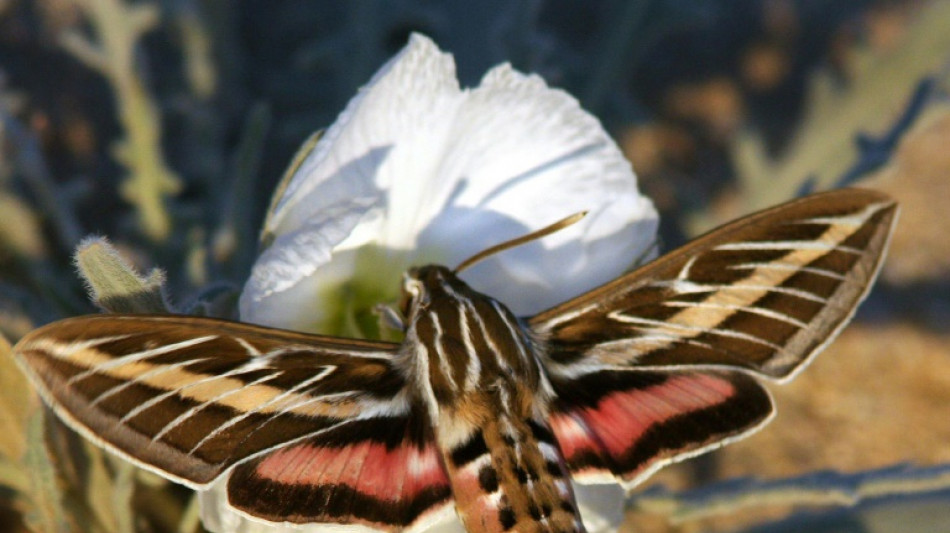
-
 US Afghans in limbo after Washington soldier attack
US Afghans in limbo after Washington soldier attack
-
England lose Duckett in chase of record 435 to keep Ashes alive

-
 Australia all out for 349, set England 435 to win 3rd Ashes Test
Australia all out for 349, set England 435 to win 3rd Ashes Test
-
US strikes over 70 IS targets in Syria after attack on troops

-
 Australian lifeguards fall silent for Bondi Beach victims
Australian lifeguards fall silent for Bondi Beach victims
-
Trump's name added to Kennedy Center facade, a day after change

-
 West Indies 206-2, trail by 369, after Duffy's double strike
West Indies 206-2, trail by 369, after Duffy's double strike
-
US strikes Islamic State group in Syria after deadly attack on troops

-
 Epstein files opened: famous faces, many blacked-out pages
Epstein files opened: famous faces, many blacked-out pages
-
Ravens face 'special' Patriots clash as playoffs come into focus

-
 Newly released Epstein files: what we know
Newly released Epstein files: what we know
-
Musk wins US court appeal of $56 bn Tesla pay package

-
 US judge voids murder conviction in Jam Master Jay killing
US judge voids murder conviction in Jam Master Jay killing
-
Trump doesn't rule out war with Venezuela

-
 Haller, Aouar out of AFCON, Zambia coach drama
Haller, Aouar out of AFCON, Zambia coach drama
-
Nasdaq rallies again while yen falls despite BOJ rate hike

-
 Bologna win shoot-out with Inter to reach Italian Super Cup final
Bologna win shoot-out with Inter to reach Italian Super Cup final
-
Brandt and Beier send Dortmund second in Bundesliga

-
 Trump administration begins release of Epstein files
Trump administration begins release of Epstein files
-
UN Security Council votes to extend DR Congo mission by one year

-
 Family of Angels pitcher, club settle case over 2019 death
Family of Angels pitcher, club settle case over 2019 death
-
US university killer's mystery motive sought after suicide

-
 Rubio says won't force deal on Ukraine as Europeans join Miami talks
Rubio says won't force deal on Ukraine as Europeans join Miami talks
-
Burkinabe teen behind viral French 'coup' video has no regrets

-
 Brazil court rejects new Bolsonaro appeal against coup conviction
Brazil court rejects new Bolsonaro appeal against coup conviction
-
Three-time Grand Slam winner Wawrinka to retire in 2026

-
 Man Utd can fight for Premier League title in next few years: Amorim
Man Utd can fight for Premier League title in next few years: Amorim
-
Pandya blitz powers India to T20 series win over South Africa

-
 Misinformation complicated Brown University shooting probe: police
Misinformation complicated Brown University shooting probe: police
-
IMF approves $206 mn aid to Sri Lanka after Cyclone Ditwah

-
 Stocks advance as markets cheer weak inflation
Stocks advance as markets cheer weak inflation
-
Emery says rising expectations driving red-hot Villa

-
 Three killed in Taipei metro attacks, suspect dead
Three killed in Taipei metro attacks, suspect dead
-
Seven Colombian soldiers killed in guerrilla attack: army

-
 Amorim takes aim at Man Utd youth stars over 'entitlement'
Amorim takes aim at Man Utd youth stars over 'entitlement'
-
Mercosur meets in Brazil, EU eyes January 12 trade deal

-
 US Fed official says no urgency to cut rates, flags distorted data
US Fed official says no urgency to cut rates, flags distorted data
-
Rome to charge visitors for access to Trevi Fountain

-
 Spurs 'not a quick fix' for under-fire Frank
Spurs 'not a quick fix' for under-fire Frank
-
Poland president accuses Ukraine of not appreciating war support

-
 Stocks advance with focus on central banks, tech
Stocks advance with focus on central banks, tech
-
Amorim unfazed by 'Free Mainoo' T-shirt ahead of Villa clash

-
 PSG penalty hero Safonov ended Intercontinental win with broken hand
PSG penalty hero Safonov ended Intercontinental win with broken hand
-
French court rejects Shein suspension

-
 'It's so much fun,' says Vonn as she milks her comeback
'It's so much fun,' says Vonn as she milks her comeback
-
Moscow intent on pressing on in Ukraine: Putin

-
 UN declares famine over in Gaza, says 'situation remains critical'
UN declares famine over in Gaza, says 'situation remains critical'
-
Guardiola 'excited' by Man City future, not pondering exit

-
 Czechs name veteran coach Koubek for World Cup play-offs
Czechs name veteran coach Koubek for World Cup play-offs
-
PSG penalty hero Safonov out until next year with broken hand


Noxious fumes at night aren't a pollinating moth's delight
Certain plants have flowers that open only in the evening, and depend on nocturnal pollinators such as moths to thrive.
But a new paper published in Science on Thursday finds an atmospheric pollutant that is much more prevalent at night drastically reduces the fluttering creatures' ability to track floral scents.
It adds to a growing understanding of how human activities, including not just air but also light and noise pollution, are negatively impacting the natural world.
"Our impacts on the environment are affecting human health, etc, that we tend to concentrate on, but they're also affecting ecosystem functioning through these plants and pollinators," senior author Jeff Riffell, a biology professor at the University of Washington, told AFP.
Riffell said the role of nitrate radicals (NO3) on flower scents hadn't been well studied, because the chemical is around at night and prior research focused on the impacts of pollution on daytime pollinators like bees.
Nitrate radicals form when nitrogen dioxide reacts in the atmosphere with ozone -- both of which come from burning fossil fuels, and have natural sources too.
Unlike nitrogen dioxide and ozone, however, nitrate radicals rapidly degrade in sunlight, making them virtually absent in daytime.
For their study, Riffell and colleagues chose the pale evening primrose (Oenothera pallida), a wildflower that grows in arid settings across the western United States.
Its white flowers emit a strong, piney scent that attracts the white-lined sphinx moth (Hyles lineata) and the tobacco hawk moth (Manduca sexta), species which use their powerful antennae to sniff out pollen from miles away.
- Pollinator crisis -
First, the team chemically analyzed the wildflower's scent to unravel its chemical recipe, revealing a complex bouquet of chemicals.
Next, they separated out the individual chemicals and exposed them one at a time to the moths, to determine exactly which ones were responsible for attracting the winged insects.
This revealed a subset of the chemicals, known as monoterpene compounds, were largely responsible for the scent, and further tests showed that nitrate radicals decimated the levels of these compounds.
Finally, the team carried out wind tunnel experiments involving the moths and the scent chemicals that they emitted at controlled levels from a fake flower.
"What we found is that the moths really were very sensitive to the flower scent and would kind of navigate upwind and try to feed from this artificial flower," said Rifell.
"But if we added NO3, then all of a sudden, for one species of moth, it totally eliminated their ability to recognize the flower. And for another species, it reduced their attraction to the flower by 50 percent."
The nitrate radicals were comparable to those found at night in a typical urban environment, modeled on Seattle. When the team ran the experiment with the pollutants typically present during the day, they saw far less of an impact.
Overall, the experiment revealed a strong impact on pollination activity, at a time when the world's pollinators are in crisis.
Around three-quarters of the more than 240,000 species of flowering plants depend on pollinators, and over 70 pollinator species are endangered or threatened, said Rifell.
The team also ran computer simulations to determine which parts of the world would be most likely to experience problems as a result of this effect.
Areas identified include much of Europe, the Middle East, Central and South Asia, and southern Africa.
"Outside of human activity, some regions accumulate more NO3 because of natural sources, geography and atmospheric circulation," said co-senior author Joel Thornton, a professor of atmospheric sciences.
"But human activity is producing more NO3 everywhere. We wanted to understand how those two sources — natural and human — combine and where levels could be so high that they could interfere with the ability of pollinators to find flowers."
F.Bennett--AMWN


